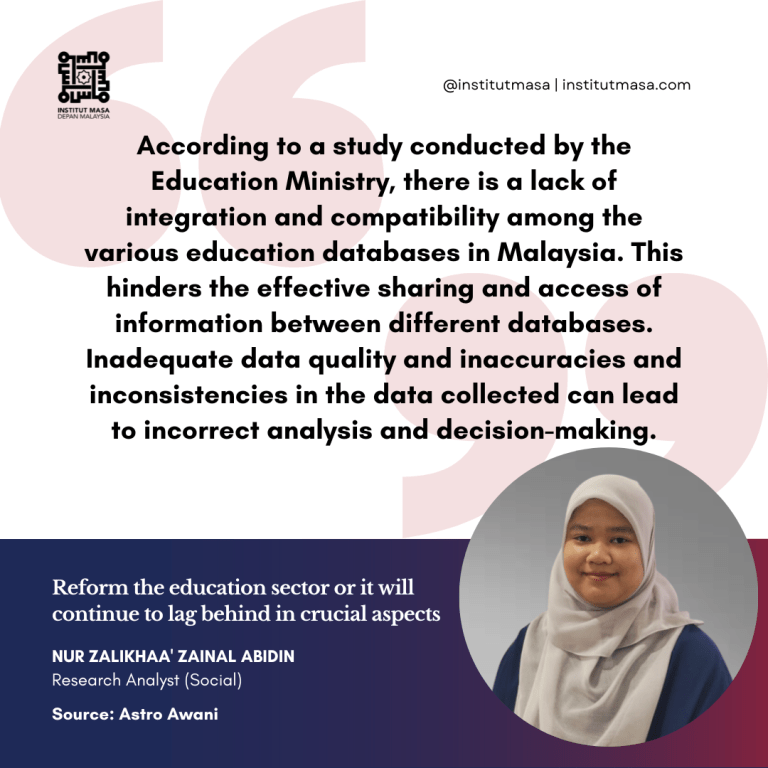Oleh Nur Zalikhaa’ Zainal Abidin
THE fact that Malaysian children are not learning enough in schools, relative to the time spent there, speaks volume of the needs for the relevant authorities, in particular, the Education Ministry, to come up with its own mechanism or framework that could help improve and support our students.
According to the World Bank’s “Bending Bamboo Shoots: Strengthening Foundation Skills” report on education in Malaysia, 42 per cent of Malaysian students failed to achieve proficiency in reading by the end of Standard Five.
Malaysian students spend an average of 12.5 years in school but learn the equivalent of only 8.9 years. In comparison, Vietnamese students spend an average of 12.9 years in school and learn the equivalent of 10.7 years while Singaporean kids spend 13.9 years in school and learn the equivalent of 12.8 years.
This worrisome data sparks the urgency for the Education Ministry to have its own centralized framework or database that can better identify and support students, especially those from disadvantaged backgrounds and poor families, towards an equitable access to quality education.
Maybe Education Minister, Fadhlina Sidek, should focus more on ways to improve early childhood education as a start to nurturing young learners towards realizing their potential and future success.
Maybe she should look at PADU, the government’s centralized database hub that contains individual and household profiles, encompassing citizens and permanent residents in Malaysia, as an impetus to build a strong educational foundation to transform our children’s early education system.
It is said that PADU could help reduce gaps in the existing education data by integrating information from various government agencies and databases, vis-à-vis B40 group and its locality, thus, providing a more complete picture of students’ backgrounds, needs and their performances.
This definitely can assist the ministry in its early intervention programmes, for instance, in addressing “learning loss” among poor school children.
While PADU is primarily focused on socio-economic data for subsidy rationalization, there is potential for a similar database system to be developed specifically for the education sector in Malaysia as a comprehensive data integration would be valuable for this country’s education sector. Nevertheless, this requires careful designs and integrations of education-specific data and stakeholder engagement in order for it to be truly effective.
A recent United Nations Children Fund (UNICEF) report highlighting the problems faced by people, stated that the access to early education was rather worrying. The pre-school education enrolment stood at 71 per cent, lower than 87 per cent of the national enrolment average. The report highlighted concerns of parents of handicapped and disabled children who were forced to shoulder the burden as compared to parents from other groups.
According to the report, the access to education was insufficient, mainly due to poverty and lack of infrastructure. Slow recovery from the Covid-19 pandemic was also cited as among the reasons for school dropout and absenteeism.
The United States’ National Assessment of Educational Progress (NAEP) is exemplary in that it is well-established and is a recognised assessment system in the world. NAEP provides a standardised measure of student achievement across various subjects, offering valuable insights into the performance of the education system at the national, state and district levels.
It is also considered a “gold standard” in educational assessment as it employs rigorous methodologies and represents the collective expertise of assessment and content specialists, state education staff and teachers from across the US.
The results of NAEP are widely used to inform policy decisions and drive improvements in the education system.
To effectively leverage a PADU-like database for the education sector, it is important to ensure the integration of relevant education data points such as student’s performance, quality of teachers and learning outcomes. Additionally, close collaboration with the education community is crucial to ensure the system’s relevance and acceptance.
Robust data validation mechanisms must be in place to verify the integrity of educational data stored in the education system. Additionally, stringent data protection protocols should safeguard sensitive information to prevent misuse or unauthorised access, particularly concerning students’ and teachers’ data.
By enhancing data integration, ensuring data accuracy and privacy and leveraging PADU’s capabilities for education assessment, Malaysia can establish a robust framework for monitoring and improving educational outcomes.
The evolution of PADU into a comprehensive tool for education assessment signifies a significant step towards data-driven governance and educational excellence in the country. Probably, it could help resolve some of the issues facing our education system such as the lack of integration and compatibility.
According to a study conducted by the Education Ministry, there is a lack of integration and compatibility among the various education databases in Malaysia. This hinders the effective sharing and access of information between different databases. Inadequate data quality and inaccuracies and inconsistencies in the data collected can lead to incorrect analysis and decision-making.
Privacy and security concerns which entail the collection and storage of personal information in education databases, always raise privacy and security concerns. There is a risk of unauthorized access and misuse of sensitive data which could compromise the privacy of students and educators.
Overall, these issues highlight the need for improvements and upgrading of the country’s education database for data quality, accessibility, privacy and collaboration among stakeholders. Henceforth, immediate reforms in the education sector need to be addressed seriously or Malaysia continues to lag far behind in crucial aspects such as competitiveness and socioeconomic development.




